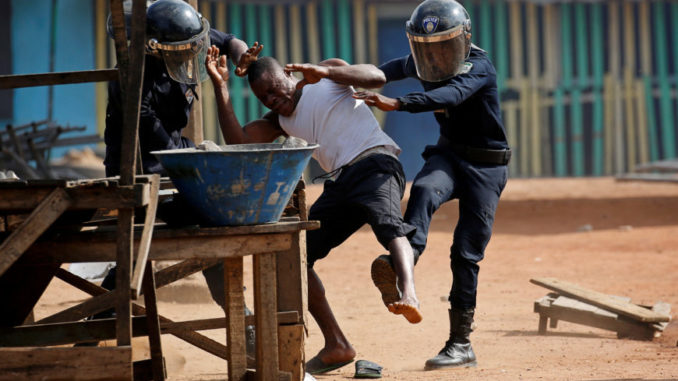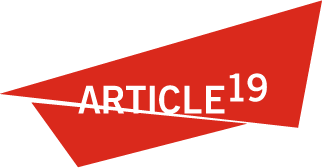
ARTICLE 19 strongly condemns the deadly violence and repression of protesters and the ongoing stifling of the freedom of expression and the right to protest in Côte d’Ivoire. The different protests organised across the country against the decision of President Alassane Dramane Ouattara to stand for a third term have resulted in deadly violence and repression. The protests in Divo in the south of the country during the weekend of 22 and 23 August caused the death of four people and several injured and properties destroyed. The police used tear gas to disperse them.
On 21 August 2020 a dozen women were arrested during a demonstration at Sodemi Square. Following protests in the previous week, at least six people were killed, 173 were injured and at least 69 people arrested including five women.
“The events of the last two weeks have plunged Côte d’Ivoire into a climate of violence, fear and insecurity. The bloody violence during the protests constitutes a threat to democracy and results in stifling dissident voices.” said Fatou Jagne Senghore, Regional Director of ARTICLE 19, West Africa.
“Freedom of expression and the right to protest are important human rights, essential in a democratic society. They are guaranteed by the national, and international law and standards subscribed to by the Côte d’Ivoire.”
President Ouattara’s decision for a third term and government ban on protests
After committing on 5 March 2020 not to stand for the presidential election of 31 October 2020, President Ouattara came back to his pledge during a speech delivered on the occasion of the 60th anniversary of independence in August and announced his candidature.
The opposition and civil society subsequently called for demonstrations against the third term of President Alassane Ouattara. In reaction to spontaneous protests that began in different parts of the country and after receiving notification of various protest, the government banned public demonstrations.
In a press release issued on 12 August, the Minister of Territorial Administration and Decentralisation Sidiki Diakite banned the demonstration planned for 13 August. The government went even further and after the Cabinet Meeting of 19 August 2020 announced a ban on demonstrations until 15 September 2020. In this restrictive civic space context, President Ouattara was officially picked as Presidential candidate of his party, RHDP.
“Two months ahead of the presidential election, these drastic measures are muzzling freedom of expression and the right to protest. It’s shocking to close in such a way the civic space prior to a democratic presidential election,” said Fatou Jagne Senghore.
ARTICLE 19 is very concerned about the government’s response to these protests. The authorities must immediately lift the ban, which constitutes a real step backward for free speech and the right to protest and undermines citizen’s participation. Such emergency measures should never be used for political gain.
The 1960 Law and the 2016 Constitution in Côte d’Ivoire guarantee the freedoms of association, assembly and peaceful demonstration. The National Human Right Commission of Côte d’Ivoire has explicitly stated that only notification is required and no authorisation is needed to organise a protest.
During the 2019 Universal Periodic Review (UPR), Côte d’Ivoire agreed to effectively guarantee freedom of assembly as enshrined in the Constitution and to ensure that journalists, human rights defenders and other civil society actors are able to freely exercise their rights to freedom of expression, association and without fear of reprisals, intimidation or harassment, in particular in the context of the next presidential election in 2020.
“The recent ban on protest prior to an upcoming election is a step backwards. It totally goes against Côte d’Ivoire’s own legislation and the international commitments and obligations to ensure free expression.”
Since 2019, Côte d’Ivoire has regularly suppressed public demonstrations of political parties and civil society. In June 2019, the country revised its penal code criminalizing any public and unarmed gathering that could disturb public order. Keeping the definition of “public order” vague and open to interpretation of the authorities, can cause a rise in abuses. This provision is preventing the expression of dissenting voices and violates freedom of expression and the right to assemble peacefully.
Unlawful arrests of women
On 21 August, a dozen women were arrested at Sodemi Square during the peaceful Women’s demonstration against the President Ouattara’s decision to stand for a third term. They braved the government ban on demonstrations and exercised their right to protest but the police used tear gas to disperse them.
During protests on 13 August 2020, five women, amongst whom Anne-Marie Bonifon coordinator of Générations et Peuples solidaires (GPS), were arrested for “disturbing public order, inciting revolt, violence against law enforcement officials and destruction of other people’s property.”
During the nights of 15 and 16 August, the authorities carried out a series of arrests of civil society members in Abidjan including Pulchérie Gbalet, president of Alternative Citoyenne Ivoirienne (ACI), who is accused of “inciting revolt and calling for insurrection” and is being held in Abidjan in the office of Unité de lutte contre le grand banditisme (ULGB, a police section). She was reportedly arrested together with two of her colleagues and she was placed under warrant of committal in Abidjan prison on Wednesday 19 August.
Cote d’Ivoire is a state party to the Protocol to the African Charter on Human and Peoples’ Rights on the Rights of Women in Africa, which requires the country to ensure women can freely participate in the political and decision making processes.
“If women cannot even express their political opinion without risking arrests, how can we expect women to feel free to fully participate in the political process? The arrest of these women is yet another example that Cote d’Ivoire is totally failing to ensure that all women can equally participate in the political life. The government must release them immediately,” said Fatou Jagne Senghore.
Deadly violence and repression during protests
In the night of 22 to 23 August, according to local media, during the clashes four persons were killed in Divo, several injured and properties damaged as a result of violent protests following the investiture of President Ouattara as RHDP’s candidate to the upcoming presidential elections. There remains tension in Gagnoa and Bonoua, where also violent protests and clashes occurred.
Between 10 and 14 August, there was high tension in several cities in Côte d’Ivoire including Abidjan, Daoukro, Bonoua and Ferkéssédougou. There were clashes between demonstrators and security forces resulted in the deadly shooting of an 18-years-old in Bonoua. In Daoukro, four people were killed during the demonstrations. In Port-Bouët and other areas, citizens went out to demand the departure of the president after completing his ongoing second term. Several people were injured, and others arrested during these protests.
According to the Ivorian Minister of security and civil protection, General Diomande, 69 protesters were arrested for “disturbing public order, inciting revolt, violence against law enforcement officials and destruction of other people’s property.” A total of 173 people were injured, including 10 policemen, two gendarmes and 92 civilians, and six died, four in Daoukro, one in Gagnoa and one in Bonoua.
“ARTICLE 19 strongly condemns the loss of human lives during the violent clashes between protesters and enforcement officials for expressing their freedom of speech and assembly. Protest is a right. The authorities must immediately release those arrested, investigate what caused the violence and deaths and bring to justice those responsible for the crackdown. The authorities should further end the crackdown and ban on protests.”
“It is important for citizens to be able to exercise their right to protest. The right to life is inherent to every person and the authorities must guarantee the security of every person.”
According to Amnesty International, armed persons infiltrated the protests and assaulted the protesters in Yopougon without the police intervening or arresting them. The police failed to fulfil their obligation to ensure the right to protest and protect protesters from violence.
The Guidelines on Freedom of Association and Assembly in Africa stress that protest is a right. In addition, the African Commission’s Guidelines on the Control of Assemblies by Law Enforcement Agencies in Africa set out the security forces’ role during protests, including the obligation to protect protesters. Likewise, the UN Basic Principles on the Use of Force and Firearms by Law Enforcement Officials and the UN Code of Conduct for Law Enforcement Officials clarify their role.
The Minister of the security and protection did not accept any responsibility of the government in the repression of the protest, but instead underlined the unlawful character of these protests and insisted that the instigators of the violence and its perpetrators will be brought to justice.
ARTICLE 19 reiterates that not authorising a demonstration does not in itself make it illegal. There must be space for spontaneous gatherings. Freedom of expression and freedom to protest are human rights, essential in each democratic society.
“We call on the government to investigate the role played by security forces and ensure that steps are taken to any security force official who failed to protect protesters or is suspected of using excessive force. If there is evidence any protester is suspected of a crime, they should be charged to court,” concluded Fatou Jagne Senghore.
The Secretary General of the United Nations expressed concern about the violence in a statement and called on all stakeholders to resolve their differences through dialogue and to create an environment conducive to a peaceful, inclusive and credible election.
Mrs Marthe Coulibaly, National Coordinator of the Ivorian coalition of human rights defenders echoed the concerns about the ban on protests, saying:
“The government must guarantee freedom of protest to all citizens, both for activists from the ruling parties and opposition leaders who still do not have this opportunity. It is also important to deliver a permit to demonstrate for human rights defenders who unfortunately find themselves struggling with the difficulty of not being able to exercise their rights. The right to demonstrate is enshrined in the Ivorian law on human rights defenders and the authorities must respect the law.”
Recommendations
ARTICLE 19 urges the authorities to:
- Unconditionally release all those arrested only for exercising their rights to freedom of expression, association, and assembly.
- Open an independent and transparent investigation to identify the causes of deadly violence, arbitrary bans on protest and unlawful arrests and bring to justice those suspected to be responsible criminal acts in fair trials.
- Lift all measures aimed at restricting the right to protest and freedom of expression and refrain from any action that increases tension and violence and worsens the already harmful political situation.
For more information, please contact:
Eliane NYOBE, Senior Programme Assistant, ARTICLE 19 West Africa.
E: eliane@article19.org; T: +221 33 869 03 22
Follow us on TW: article19wafric and FB:facebook.com/Article19wafric
